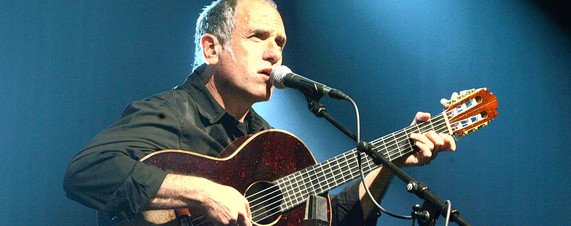By JOHN JURGENSEN
They shared a stage in Houston back in 1994. That was the sum of the relationship between Townes Van Zandt, an iconic singer-songwriter from Texas, and David Broza, a balladeer from Israel. Only after the hard-living Mr. Van Zandt died in 1997 at age 52 did an unlikely bond unite the two musicians: a dozen unpublished poems of Mr. Van Zandt’s handed down to Mr. Broza, who set them to music.
In the world of Americana music, that’s the equivalent of a little-known novelist completing some of Jack Kerouac’s manuscripts after meeting the author at a reading.
Mr. Van Zandt, who sang stories about wandering and yearning in a plain voice, was revered among singer-songwriters, yet never broke out of cult status as a performer. Stars like Merle Haggard and Willie Nelson, who had a hit with Mr. Van Zandt’s “Pancho and Lefty,” made his songs more familiar. Steve Earle, whom Mr. Van Zandt mentored, recently won a Grammy Award for his album “Townes,” featuring songs from “the career of one of the best songwriters that ever lived,” Mr. Earle said about the album.
The career of Mr. Broza, 54, developed in a different sphere. Born in Haifa, he also grew up in England and Spain. Having released more than 20 albums in Hebrew, Spanish and English, he’s a major star abroad.
Mr. Broza hopes Mr. Van Zandt’s high standing will help him bootstrap to a bigger audience in the U.S. Mr. Broza’s album “Night Dawn: The Unpublished Poetry of Townes Van Zandt” comes out Tuesday. Mr. Broza says, “I feel like a knight in armor, and that armor is his poetry.”
The 1994 concert in Houston was a “writers-in-the-round” show that Mr. Broza recalls as “almost like a duel” between himself and Mr. Van Zandt, who surrounded his chair with silver pieces, stones and other charms. Linda Lowe, who organized and participated in that performance along with another songwriter, David Amram, says the experience lingered with Mr. Van Zandt, who reminisced about it on the phone with her before his death.
“He was talking about meeting his maker. He’d recite poetry or songs—I couldn’t always tell which—and he would talk about that concert,” Ms. Lowe says.
Mr. Van Zandt died of a heart attack in 1997, after years of alcoholism. Based on her phone conversations, Ms. Lowe urged Mr. Broza to pursue the unpublished material.
He pitched his plans for it to the late singer’s ex-wife, Jeanene, over dinner in New York after a tribute concert to Mr. Van Zandt. As executor of the will, she told Mr. Broza she’d consider his request, but wanted to leave the window open to other musicians, including high-profile artists who might generate greater interest and record sales. “You never know when a Bob Dylan or somebody will come along,” Ms. Van Zandt says.
After eight years passed, Mr. Broza again contacted Ms. Van Zandt, who emailed him an assortment of lyrics and poems, including “Jeanene,” a love poem that Mr. Van Zandt left on her pillow before leaving on one of his final concert tours. (“He wrote the last verse on a barf bag on the airplane home,” Ms. Van Zandt says.) She and the late singer’s three children own the publishing rights to the late singer’s songs. Though she agreed to a 50% split with Mr. Broza on the song recordings he made, she retains full ownership of the lyrics themselves.
Mr. Broza carried the stanzas and prose scraps for four years as he conjured melodies for them. The lyrics to “Southern Cross,” including a line about riding “a jalopy out to the West,” seemed to beg for a country twang, a new sound for Mr. Broza. On “Soul to Soul,” Mr. Broza’s gently swinging guitar adds light to lines such as “the red of my blood will show by and by.” Mr. Broza produced the album with G.E. Smith, the former musical director of “Saturday Night Live.”
As he prepares for a tour and faces the challenge of finding a broader audience, Mr. Broza feels an affinity for Mr. Van Zandt, who also worked the margins of American music. He says, “That’s what I love about this country, that the underdogs have a legitimate place in the culture.”
Write to John Jurgensen at [email protected]



![[ADVISER2]](http://si.wsj.net/public/resources/images/WK-AS887_ADVISE_A_20100218205323.jpg)
